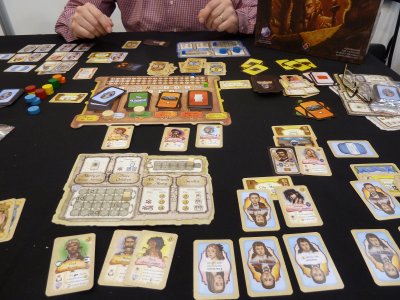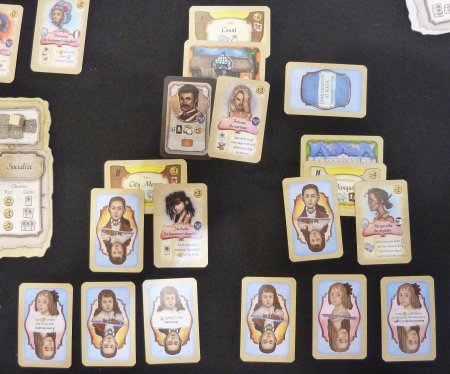

THE TESTAMENT OF DUKE DE CRECY | ||
![[IMAGE]](../bilder/lecrecy1.jpg) |
Author: Publisher: No. of Players: Awards: |
![[IMAGE]](../technik/box/rot/rot-5.gif) ![[IMAGE]](../technik/box/gelb/gelb-7.gif) ![[IMAGE]](../technik/box/grun/grun-5.gif) ![[IMAGE]](../technik/box/pink/pink-9.gif) ![[IMAGE]](../technik/box/blau/blau-10.gif) |
|
When the first boardgames using the worker placement mechanism appeared some years ago, gamers were fascinated by this new idea, and a virtual flood of games followed which varied the mechanism in the one or other way in order to offer enough originality to allow publication. As with all gaming trends, some of these clones were good and some were awful, but even today the use of this mechanism has not subsided.
I have read that Legacy: The Testament of Duke de Crecy would be a loose variation of worker placement, and behind the somewhat unusual title hides a game about French aristocrats in the pre-revolutionary time from 1720 to 1780. At that time the players take the role of heads of families who want to lead their family to fame and glory. However, the game does not simply focus on the deeds of the player's character as the family head, but it will actually run for three generations in which the players will marry, have children and grandchildren. Through marrying interesting partners, the children and grandchildren all will provide the player with interesting extra options or other bonuses, and so the ever growing family tree of the players stands for the gaining of power of the families.
As indicated, the whole game is driven through a worker placement variant, and here it can be found in a way that a player usually can choose two or three actions during his turn. Actions eithetr may be chosen on each player's own (identical) family board or on the main gameboard, with the different that a token placed on one of the actions on the main gameboard will block all other players from chosing this action for this round.
The actions found on the main gameboard are focused on the major deeds which can be performed by the players. They can acquire titles or estates, they can start an enterprise to increase their income or they can get mission cards which - if succesfully performed by meeting their requirements - will bring a bonus to the player. The family board of the players on the other hand displays some of the more family related actions, and these can be chosen as often as a player wants to. These actions are marrying, getting children, socializing or getting money, and these actions give the players access to different elements which they need to build up an "effective" family.
 Legacy: The Testament of Duke de Crecy offers a rather versatile playing mechanism, with many elements tuned in a way which allows them to interact with other parts of the game. So, the player's do not just need money to invest in various elements, but another main commodity of the game are personality cards which can mainly be gained through the socializing-action, but which some other actions will provide as well. Whenever a player may take personality cards these will come from an open display or a shuffled deck, and a player will need to build up a hand of male and female personalities in order to find fitting partners for himself and for his children and grandchildren. As indicated, all these personalities have various attributes, and these range from the provision of money or victory points to many different special abilities which may be helpful at the one or other point during the game. Depending on the fact whether the player has personality cards of a matching sex on his hand, he may use the marry action in order to pair a member of his family with this personality. When a marriage is done, instantly a child card will be drawn, and so the freshly wed couple either will have a son or daughter, or the birth will fail killing child or mother (these were hard times!). More children can be born through another action on a player's family board, and the main board even offers a doctor action which allows the birth of two children at once. As indicated, the players are highly dependent on marrying their offsprings to well chosen partners, and they will use the benefits gained from these partners to work on other actions like gaining titles, increasing their income or arranging charitable events. As I could experience, an effectively organized family is the key to keep up in this game, but there are a lot of possibilities for combining the effects of various personalities so that the players won't face the problem of running into a dead end. Of course, there is one limitation, and this certainly is the number of available actions. As indicated, the game is split into three generations, and each generation offers an ever growing number of round which will be played by the players. However, like in many games the number of available actions never will be enough to perform all actions desired, and so the players will need to focus on taking the most important actions while at the same time keeping an eye on the main gameboard in order to make a timely block of an action which otherwise would have been useful for an opposing player. At the end of each round the players will collect income, and at the end of each generation victory points will be assigned. These are depending on the number of family members in the current generation, the families' fame and other factors, and at the end of the game after the third generation additional points can be gained through successfully completed missions. On first sight I wasn't sure what I should make of this theme - playing through several generations by making beneficial marriages. I asked myself whether this would be interesting enough to warrant a boardgame, but already after first play I had to confess that I am seriously hooked to this game! It's absolutely fascinating to see your family grow during the course of the game, an it's even more interesting to consider how a player's power increases through clever marriages and the use of the finely interwoven available actions. The cartoon-like graphics of the characters first may suggest that Legacy: The Testament of Duke de Crecy is a light game, but this first impression is wrong because an intelligent and rather enjoyable playing mechanism is waiting for the players!  | ||
|
| ||

|
|

|
|
| ||
|
Impressum / Contact Info / Disclaimer Kulkmann@aol.com
Copyright © 2013 Frank Schulte-Kulkmann, Essen, Germany | ||